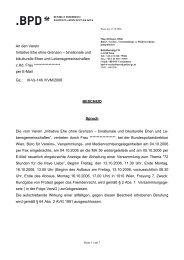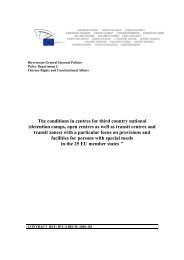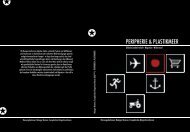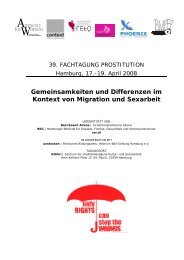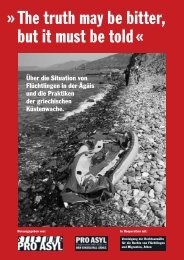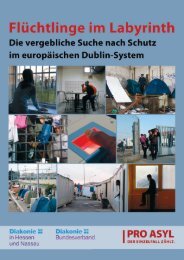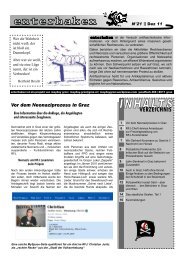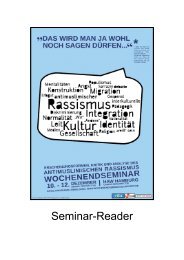Turin's CIE - International University College of Turin
Turin's CIE - International University College of Turin
Turin's CIE - International University College of Turin
Create successful ePaper yourself
Turn your PDF publications into a flip-book with our unique Google optimized e-Paper software.
6. USE, MISUSE AND ABUSE OF PSYCHOTROPIC MEDICATION<br />
Several pr<strong>of</strong>essionals and volunteers made serious allegations about a widespread and reckless<br />
use <strong>of</strong> psychotropic medications inside the <strong>CIE</strong>, and our detainee interviews confirmed such<br />
suspicions. Whilst <strong>of</strong>ficial figures are not available, it has been alleged that one third <strong>of</strong><br />
detainees take psychotropic medication 77 , and one <strong>of</strong> our interviewees claimed that this<br />
percentage is much higher 78 . In any case, the most controversial aspect is that these medicines<br />
are given without prescription from a psychiatrist. There is no specialist inside <strong>CIE</strong>, nor are the<br />
psychologists involved in deciding whether a detainee needs psychotropic drugs. For medical<br />
staff it seems to be sufficient that the detainees request treatment and allegedly no further<br />
investigation is carried out 79 .<br />
The psychotropic medications used inside <strong>Turin</strong>’s <strong>CIE</strong> seem to be predominantly<br />
benzodiazepines: “Rivotril, Tavor, Tal<strong>of</strong>en... there are four or five kinds <strong>of</strong> medicines and they<br />
always give them here” (Interview 22). Our evidence suggests that a significant number <strong>of</strong><br />
detainees who are transferred from jail to <strong>CIE</strong> ask for such medication immediately, since <strong>of</strong>ten<br />
they are already used to taking it in prison. According to one interviewee: “their addiction to<br />
psychotropic drugs originates there. In jail there is an abuse <strong>of</strong> psychotropic medication”<br />
(Interview 28). Besides ex-prisoners, generally speaking <strong>CIE</strong> detainees “have in front <strong>of</strong> them the<br />
possibility <strong>of</strong> spending eighteen months inside the centre, with no activities, with a family outside,<br />
without having a clue <strong>of</strong> what will happen afterwards. From the psychological point <strong>of</strong> view it is a<br />
tragedy. Psychotropic drugs become a refuge, a shelter” (Interview 28).<br />
The detainees’ perspectives on this issue were quite shocking. Most <strong>of</strong> them consider<br />
psychotropic drugs to be absolutely necessary to survive inside <strong>CIE</strong>: “I’m forced to take<br />
medication because otherwise time does not pass. They give me forty drops <strong>of</strong> Minias and thirty<br />
drops <strong>of</strong> Tavor every day in the evening” (Interview 25). A further example is that <strong>of</strong> an eighteenyear-old<br />
detainee who at the time <strong>of</strong> our interview had been inside <strong>CIE</strong> for twenty-seven days.<br />
Notwithstanding his young age and the relatively short time he had spent inside <strong>CIE</strong>,<br />
psychotropic medication seemed to be essential and unavoidable to him: “Of course I have to<br />
take psychotropic drugs because here if you don’t take the therapy you go crazy. You need<br />
psychotropic drugs both to sleep and to keep quiet. Almost everybody here takes psychotropic<br />
medication” (Interview 22).<br />
However, the issue <strong>of</strong> psychotropic medication inside <strong>CIE</strong> should not be dismissed by making<br />
reference to detainees’ expressed consent, given the fact that the problem clearly has a double<br />
dimension, as one journalist observed:<br />
“On the one hand, there is a strong request for psychotropic drugs from detainees<br />
themselves [...]. On the other hand, in my opinion the problem is that doctors give<br />
psychotropic medication too easily. Doctors admit it and they justify themselves by saying<br />
that otherwise detainees would be more upset and aggressive and more keen to create<br />
problems. [...] It is anyway more convenient to have a certain number <strong>of</strong> sedated detainees,<br />
than to have people who are always ready to start a fight” (Interview 28).<br />
77 Cosentino and Genovese, “Lo scandalo dei centri di identificazione dove gli ospiti diventano detenuti”.<br />
78 “I think 70% <strong>of</strong> detainees take them” (Interview 28).<br />
79 “What we stress is that the use <strong>of</strong> these kinds <strong>of</strong> drugs in such a situation requires the intervention <strong>of</strong> a<br />
specialist, the presence <strong>of</strong> a psychiatrist able to evaluate on a case-by-case basis. In our opinion the lack <strong>of</strong> a<br />
monitoring conducted by a specialist represents an extremely relevant problem” (Interview 29); “When I asked<br />
for the medication, no psychologist came to talk with me [or] to ask me questions. And you know, these kind <strong>of</strong><br />
drugs should not be taken without the supervision <strong>of</strong> a psychologist” (Interview 20).<br />
49 | P a g e




